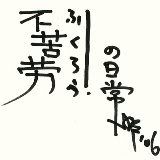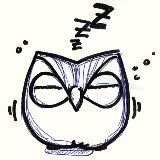- don't cook rice in front of my ass -
the phrases that linger in my mind:
(1)*Sazae-san's tune* .. ikanaide, dakishimete, i can't say goodbye~..
(2)*melody of Sen no Kaze ni Natte* .. watashi no oshiri no mae de okome takanaide kudasai~..
(by Haranishi from the manzai-combi FUJIWARA)
i feel sad for not being able to share all my happy moments with the others because sometimes, nobody has the same experience as me. sniffles.
first of all, which ryuugakusei here watches Sazae-san and knows the "chakachakachan, chakachakachan, chakachakacha-cha-chan~" song?
and also, watches manzai shows?
and reads my blog, and recognises the entertainment value found in my first few lines of today's post?
what Fujiwara? Norika? no, that's Jinnai Tomonori's girl..... by the way if you were thinking of "Oubei ka?!" that's Taka And Toshi. and "Buyuuden" is Oriental Radio. "Lin lin lin lin~..." is Tiger Lee. who else.... lol "watasheewa Yogita Ragashamanan Jawadika desuu.." that's Tokui Yoshimi, the boké from Tutorial.
talk to the japanese? yeah right. i'm sure they'll give me the you-are-supposed-to-be-a-gaijin-why-do-you-know-so-much-about-japan face. i'm grateful enough that they accept me reading almost everything from Shounen Jump.
speaking of which i was happily harmonising with Mackey on Kobukuro's "Sakura", when suddenly, Tackey disrupted the peaceful moments, "Hey, why do you know this song?" why, is it a crime for a gaijin like me to know more japanese songs than you?
don't worry i'm not mad at anyone. we always talk nastily about everyone. as you know about my tsukkomi personality.
by the way, Mackey and Tackey are my classmates. small boys, they can't even drive o~hohohoho... by the way we have people with names like Kino (or Pino), Checky.. and a Paul and a Lu. no they're not foreigners. too bad we don't have a Tsubasa around. oh, and there's a Fuji and a Momo-san (in fact, 2 Momos in the volleyball class) in our class too. if you get what i mean *wink*..
as you can see by now, i am entirely distracted from my revision. yet again.
statistics have proven that i am most active in reading right before the exams start, or during the exam period. reading manga, not reference books, that is. this occurs every time, without fail. i was scrutinising the 74 chapters of Claymore to see if i've missed any tiny facts, a few days before my math and physics mid-terms.
then i started on Piano no Mori a few days before my finals began (because the movie was scheduled to be out at the same time as the Deathly Hallows). during the second (?) last week of July, i finished the 20 volumes (plus the latest chapters) of Gantz. that's because the anime was labeled "porn" when i wanted to watch it, so i thought i'd check out the manga instead....
nothing pornographic. if you don't count the girls who reveal their t**ts and a teaser amount of p***c hair..... and the m*st*rb*tion. and the r*ping (dead man r*pes long-neck demon, yo).. but that's not the main theme of the story!
right. i feel a bit disgusted for myself for typing out those unfamiliar words.
yeap. the day i conquered Gantz was the day that i fell. the next day was the day that i realised i made a BIGGGG mistake. unfortunately, i'm a person who doesn't know the meaning of "to regret".
in conjunction with the start of Higurashi no Naku Koro ni ~ Kai, i started reading the manga version. can't wait to spoil myself (though i'm already pretty spoilt by now, on the intellectual aspect), i read a bit of the "Kai" chapters, the "Solution" chapters if you translate it to English. and you'll find out that the author(s) have written the story in a very tricky way. "nothing's what it seems," as the saying goes. what confused me when i first watched this anime last year, is that i didn't know that the 4 arcs share the same characters, but they are not related to each other at all. AT ALL. it's just 4 possible incidents that could happened on those people.
it's like the theory of Schrödinger's cat. all of us have a body (an existence) each in different dimensions. eg.. in dimension A, i'm blogging. in dimension B, i might be sitting on the same chair, munching Pocky. whereas in dimension C, i might be revising my physical chemistry, on the very same chair.. these all occur at the same time. if i'm not mistaken.... heard this Schrödinger thing during physics tuition some 5 years ago, when i was still young and pretty in my pinafore. =p
okay i think after explaining something intellectual i'm finally motivated to finish up the last bit of the hydrogen spectrum and the rydberg constant, and start on Schrödinger's equations........
*****
1) Sazae-san's tune - a comical, instrumental tune. haranishi added his self-made lyrics to entertain the audience.
2) Sen no Kaze ni Natte (I Am A Thousand Wind) - japanese song by Akikawa Masafumi which is based on the poem Don't Stand On My Grave And Weep. the original lyrics was "watashi no ohaka no mae de nakanaide kudasai (don't cry in front of my grave).." but haranishi modified it and it became "don't cook rice in front of my ass".
3) ryuugakusei - foreign student
4) boké and tsukkomi - the person who acts dumb and the person who criticise the dumb.
(1)*Sazae-san's tune* .. ikanaide, dakishimete, i can't say goodbye~..
(2)*melody of Sen no Kaze ni Natte* .. watashi no oshiri no mae de okome takanaide kudasai~..
(by Haranishi from the manzai-combi FUJIWARA)
i feel sad for not being able to share all my happy moments with the others because sometimes, nobody has the same experience as me. sniffles.
first of all, which ryuugakusei here watches Sazae-san and knows the "chakachakachan, chakachakachan, chakachakacha-cha-chan~" song?
and also, watches manzai shows?
and reads my blog, and recognises the entertainment value found in my first few lines of today's post?
what Fujiwara? Norika? no, that's Jinnai Tomonori's girl..... by the way if you were thinking of "Oubei ka?!" that's Taka And Toshi. and "Buyuuden" is Oriental Radio. "Lin lin lin lin~..." is Tiger Lee. who else.... lol "watasheewa Yogita Ragashamanan Jawadika desuu.." that's Tokui Yoshimi, the boké from Tutorial.
talk to the japanese? yeah right. i'm sure they'll give me the you-are-supposed-to-be-a-gaijin-why-do-you-know-so-much-about-japan face. i'm grateful enough that they accept me reading almost everything from Shounen Jump.
speaking of which i was happily harmonising with Mackey on Kobukuro's "Sakura", when suddenly, Tackey disrupted the peaceful moments, "Hey, why do you know this song?" why, is it a crime for a gaijin like me to know more japanese songs than you?
don't worry i'm not mad at anyone. we always talk nastily about everyone. as you know about my tsukkomi personality.
by the way, Mackey and Tackey are my classmates. small boys, they can't even drive o~hohohoho... by the way we have people with names like Kino (or Pino), Checky.. and a Paul and a Lu. no they're not foreigners. too bad we don't have a Tsubasa around. oh, and there's a Fuji and a Momo-san (in fact, 2 Momos in the volleyball class) in our class too. if you get what i mean *wink*..
as you can see by now, i am entirely distracted from my revision. yet again.
statistics have proven that i am most active in reading right before the exams start, or during the exam period. reading manga, not reference books, that is. this occurs every time, without fail. i was scrutinising the 74 chapters of Claymore to see if i've missed any tiny facts, a few days before my math and physics mid-terms.
then i started on Piano no Mori a few days before my finals began (because the movie was scheduled to be out at the same time as the Deathly Hallows). during the second (?) last week of July, i finished the 20 volumes (plus the latest chapters) of Gantz. that's because the anime was labeled "porn" when i wanted to watch it, so i thought i'd check out the manga instead....
nothing pornographic. if you don't count the girls who reveal their t**ts and a teaser amount of p***c hair..... and the m*st*rb*tion. and the r*ping (dead man r*pes long-neck demon, yo).. but that's not the main theme of the story!
right. i feel a bit disgusted for myself for typing out those unfamiliar words.
yeap. the day i conquered Gantz was the day that i fell. the next day was the day that i realised i made a BIGGGG mistake. unfortunately, i'm a person who doesn't know the meaning of "to regret".
in conjunction with the start of Higurashi no Naku Koro ni ~ Kai, i started reading the manga version. can't wait to spoil myself (though i'm already pretty spoilt by now, on the intellectual aspect), i read a bit of the "Kai" chapters, the "Solution" chapters if you translate it to English. and you'll find out that the author(s) have written the story in a very tricky way. "nothing's what it seems," as the saying goes. what confused me when i first watched this anime last year, is that i didn't know that the 4 arcs share the same characters, but they are not related to each other at all. AT ALL. it's just 4 possible incidents that could happened on those people.
it's like the theory of Schrödinger's cat. all of us have a body (an existence) each in different dimensions. eg.. in dimension A, i'm blogging. in dimension B, i might be sitting on the same chair, munching Pocky. whereas in dimension C, i might be revising my physical chemistry, on the very same chair.. these all occur at the same time. if i'm not mistaken.... heard this Schrödinger thing during physics tuition some 5 years ago, when i was still young and pretty in my pinafore. =p
okay i think after explaining something intellectual i'm finally motivated to finish up the last bit of the hydrogen spectrum and the rydberg constant, and start on Schrödinger's equations........
*****
1) Sazae-san's tune - a comical, instrumental tune. haranishi added his self-made lyrics to entertain the audience.
2) Sen no Kaze ni Natte (I Am A Thousand Wind) - japanese song by Akikawa Masafumi which is based on the poem Don't Stand On My Grave And Weep. the original lyrics was "watashi no ohaka no mae de nakanaide kudasai (don't cry in front of my grave).." but haranishi modified it and it became "don't cook rice in front of my ass".
3) ryuugakusei - foreign student
4) boké and tsukkomi - the person who acts dumb and the person who criticise the dumb.





